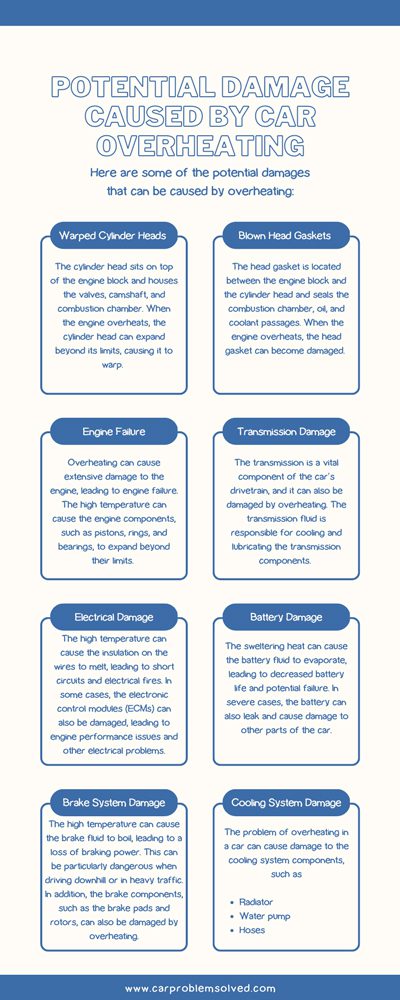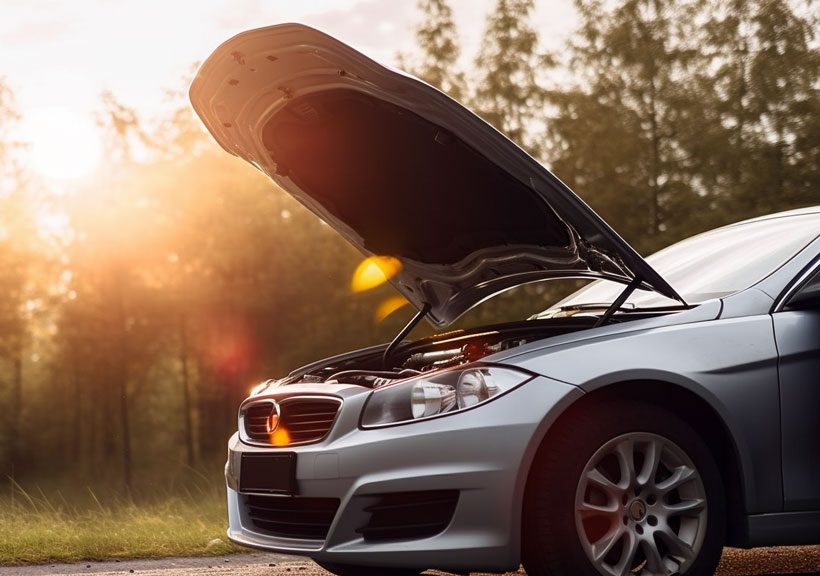Overheating a car is not only frustrating and inconvenient, but it can also cause serious damage to your car. And the damages associated with overheating can lead to costly repairs and potential safety hazards. Hence, early identification of symptoms of this problem is crucial in this regard.
So, what happens when a car overheats? Firstly, you’ll be warned by symptoms like
- Warning lights
- Steam
- Strange noises
If you notice any of these signs, it’s important to take immediate action to prevent potential damage to your car. Ignoring these manifestations can lead to
- Severe engine damage
- Warped cylinder heads
- Transmission failure
- Blown head gaskets
To learn about the underlying causes and potential damage associated with car overheating, it’s essential to read this article. You’ll be better equipped to prevent overheating if you understand these damages.
Symptoms of Car Overheating

The following are the most common signs that indicate your car is overheating:
Warning Lights
The first indication of overheating is often the warning light on the dashboard. If you notice that the temperature gauge is rising and the warning light turns on, it means that your engine is getting too hot.
Steam
Steam coming from under the hood is also a clear sign that your car is overheating. If you see steam,
- Pull over to a safe location
- Turn off the engine
- Wait for the engine to cool down before checking the coolant level and take action accordingly
Strange Noises

If your car is overheating, you may hear strange noises coming from under the hood. These sounds may include
- Bubbling or gurgling noises
- Whistling sounds
- Ticking noises
These noises can be an indication that the coolant is not circulating correctly.
Other Symptoms
In addition to these signs, you may also notice
- A decrease in power
- Reduced fuel efficiency
- A strange smell
Note: If you experience any of these signs, it is crucial to take immediate action to prevent any further damage to your car.
Underlying Causes of Car Overheating
The underlying causes of car overheating can vary, but some common issues include
- A malfunctioning cooling system
- Low coolant levels
- A faulty thermostat
- A damaged radiator
Other factors, such as driving in hot weather, high altitudes, or heavy traffic, can also contribute to overheating.

Additionally, some engine problems can also lead to overheating, such as
- A blocked or leaking coolant passage
- A broken water pump
- A malfunctioning radiator fan
Potential Damage Caused by Car Overheating

Here are some of the potential damages that can be caused by overheating:
Warped Cylinder Heads
The cylinder head sits on top of the engine block and houses the valves, camshaft, and combustion chamber. When the engine overheats, the cylinder head can expand beyond its limits, causing it to warp.
This can result in a loss of compression, leading to misfires and decreased performance. In some cases, a warped cylinder head causes engine coolant to leak into the engine oil, causing irreversible damage to the engine.
Blown Head Gaskets
The head gasket is located between the engine block and the cylinder head and seals the combustion chamber, oil, and coolant passages. When the engine overheats, the head gasket can become damaged.

This can lead to
- Coolant leaks
- Low compression
- Poor engine performance
If the head gasket fails, it can also cause coolant to mix with the engine oil, leading to engine damage.
Engine Failure
Overheating can cause extensive damage to the engine, leading to engine failure. The high temperature can cause the engine components, such as pistons, rings, and bearings, to expand beyond their limits.
This leads to metal-to-metal contact and excessive wear. In severe cases, the engine may seize or suffer catastrophic failure, leading to the need for a complete engine replacement.

Transmission Damage
The transmission is a vital component of the car’s drivetrain, and it can also be damaged by overheating. The transmission fluid is responsible for cooling and lubricating the transmission components.
If the transmission fluid gets too hot, it can break down and lose its lubricating properties. This can cause excessive wear on the transmission components, leading to transmission failure.
Electrical Damage
The high temperature can cause the insulation on the wires to melt, leading to short circuits and electrical fires. In some cases, the electronic control modules (ECMs) can also be damaged, leading to engine performance issues and other electrical problems.
Battery Damage
The sweltering heat can cause the battery fluid to evaporate, leading to decreased battery life and potential failure. In severe cases, the battery can also leak and cause damage to other parts of the car.

Brake System Damage
The high temperature can cause the brake fluid to boil, leading to a loss of braking power. This can be particularly dangerous when driving downhill or in heavy traffic. In addition, the brake components, such as the brake pads and rotors, can also be damaged by overheating.
Cooling System Damage
The problem of overheating in a car can cause damage to the cooling system components, such as
- Radiator
- Water pump
- Hoses
The high temperature can cause the coolant to boil, leading to increased pressure and eventual damage to the radiator or hoses. If the water pump fails, the engine may not be able to circulate the coolant properly, leading to engine overheating.
If your car has experienced overheating, it’s important to address the issue promptly to prevent further damage and potential breakdowns. Our article on car overheating troubleshooting provides a comprehensive guide to help you diagnose and resolve common causes of car overheating. By following the step-by-step instructions, you can identify potential issues such as coolant leaks, radiator problems, or malfunctioning cooling fans, and take appropriate measures to resolve them. Additionally, understanding specific car overheating problems and their solutions can provide valuable insights into addressing the root cause of the issue. Our article on car overheating problems with their solutions offers a detailed overview of various overheating scenarios and provides recommended solutions for each problem. By exploring these resources, you can effectively troubleshoot and resolve car overheating issues, ensuring the proper functioning and longevity of your vehicle.Conclusion
In conclusion, car overheating can cause significant damage to your vehicle, leading to costly repairs and potential safety hazards. So, it is essential to be aware of the symptoms of overheating. You will have to take immediate action if you notice any signs of trouble.
- Regular maintenance, such as coolant flushes and radiator inspections, can help in the prevention of overheating.
- Addressing overheating issues promptly is crucial for preventing costly repairs and ensuring your vehicle’s longevity.
- Don’t ignore warning lights or strange noises, and always pull over to a safe location if you suspect your car is overheating.
Taking these steps can prevent damage to your car, helping it run smoothly for years to come.
